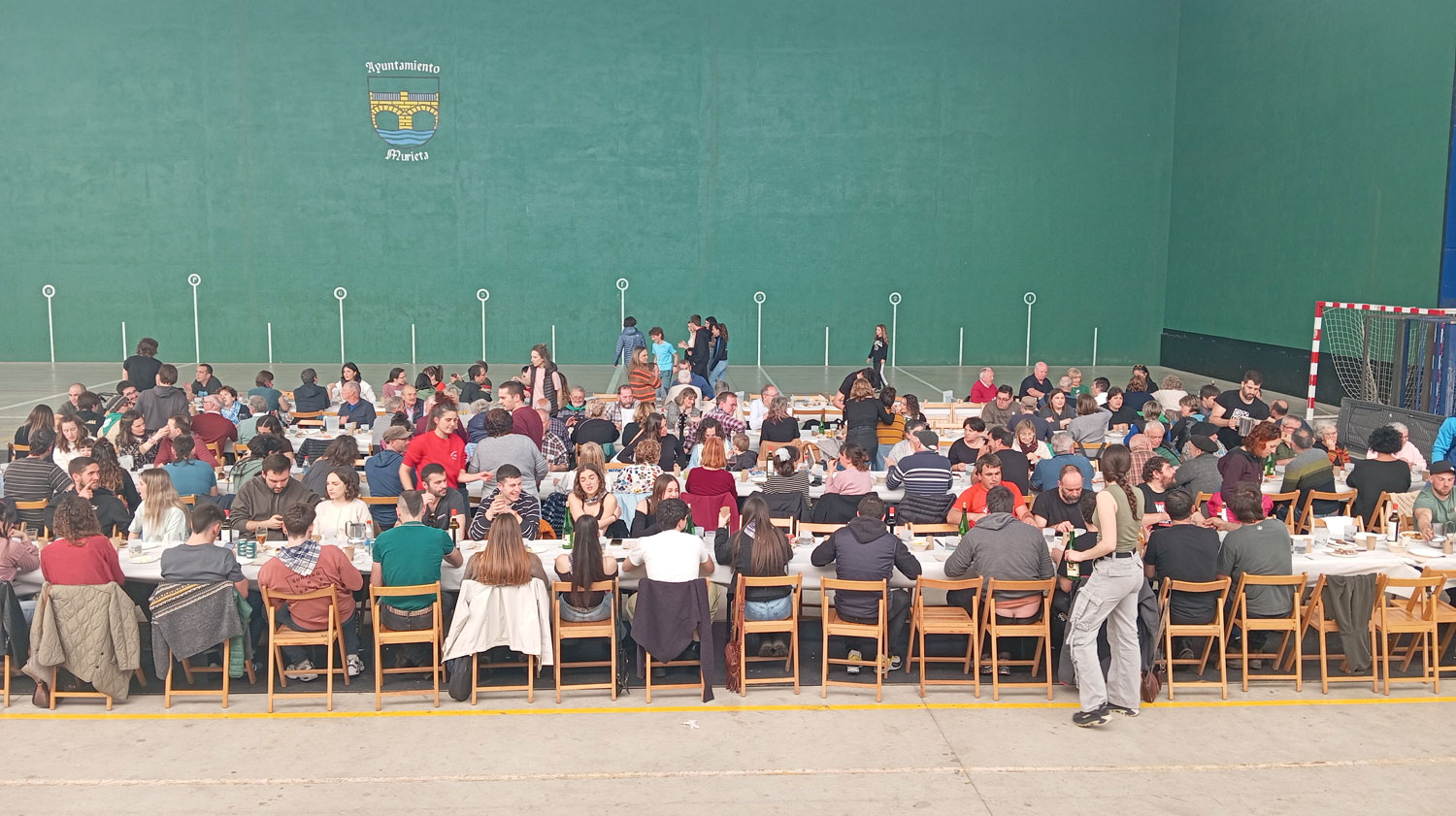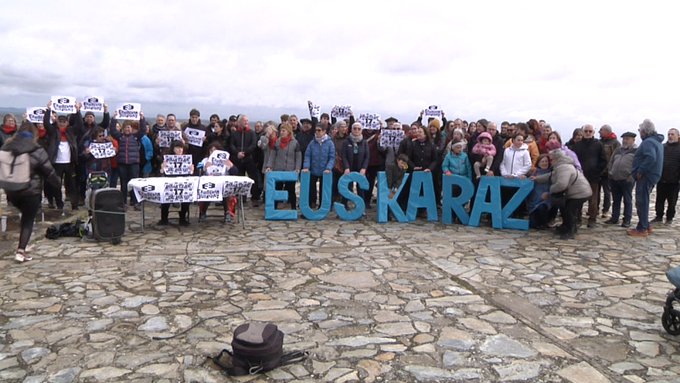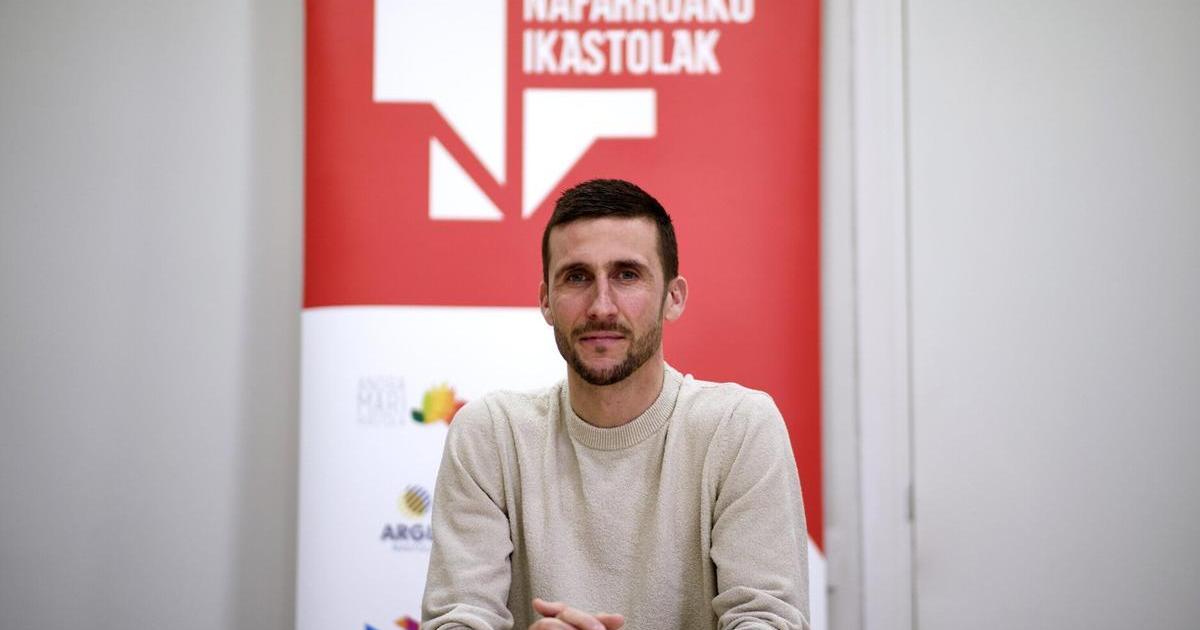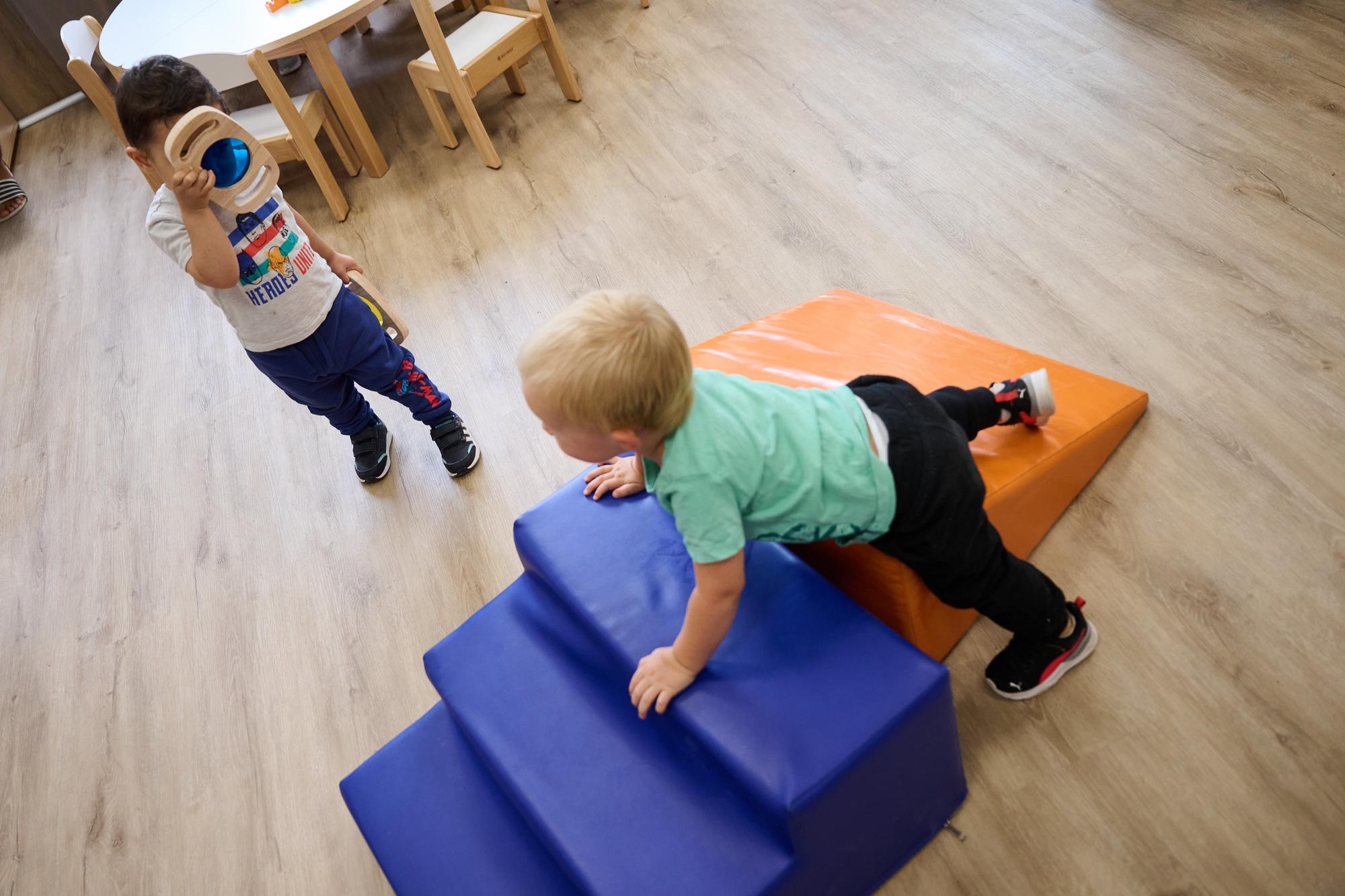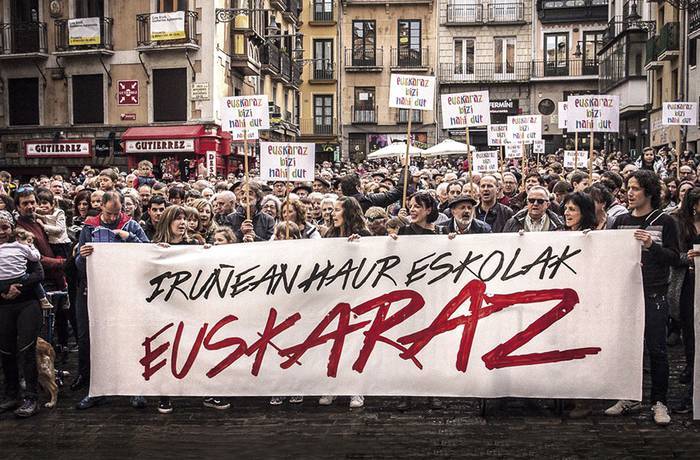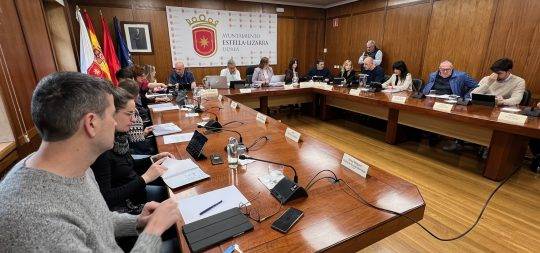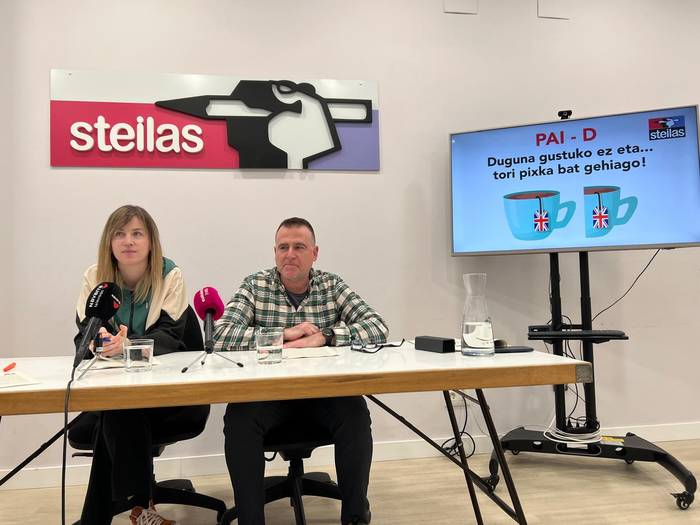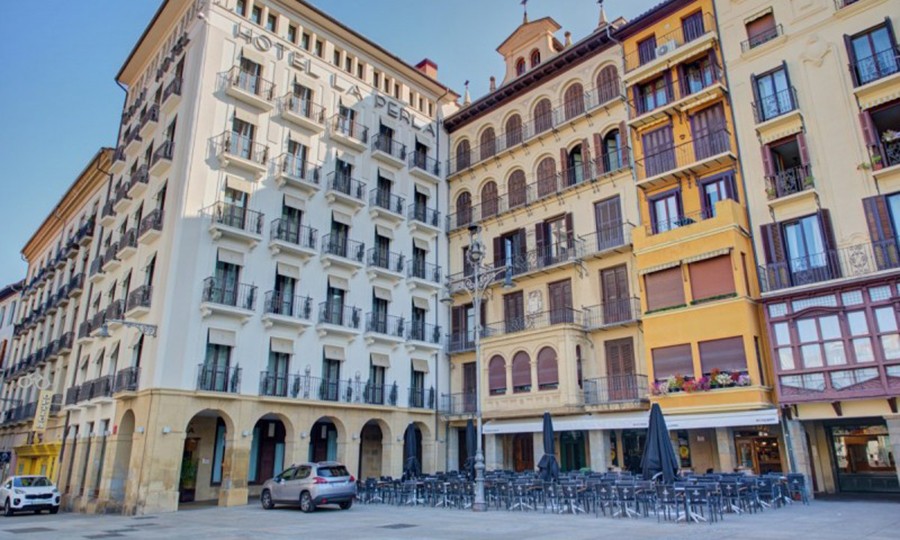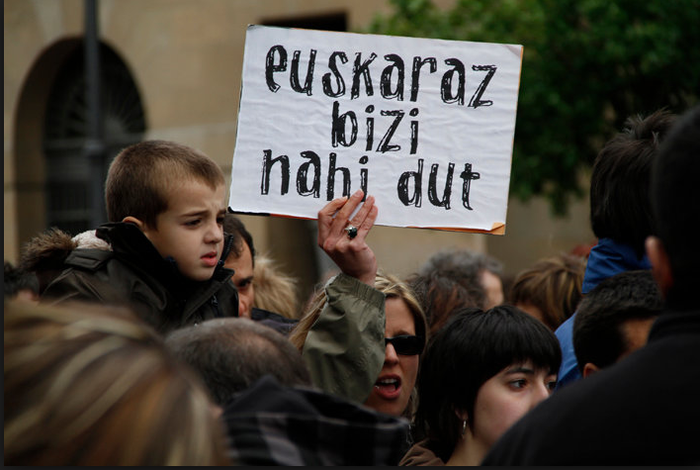A study concludes that the majority of the inhabitants of Navarre, 63%, are in favor or very favorable to the promotion of the Basque language
- The majority of the inhabitants of Navarre (63%) are "supporters or very supporters of the promotion of the Basque language" and only 17% oppose it, according to a study carried out by Xabier Erice and Carlos Vilches in the framework of the agreement between Basque Language Learning and the Department of Memory and Coexistence, External Action and Euskera of the Government of Navarre. This is the main conclusion of the research aimed at improving the knowledge of the sociolinguistic reality of the Foral Community and the values that have the greatest impact on the population in relation to the promotion of the Basque language.
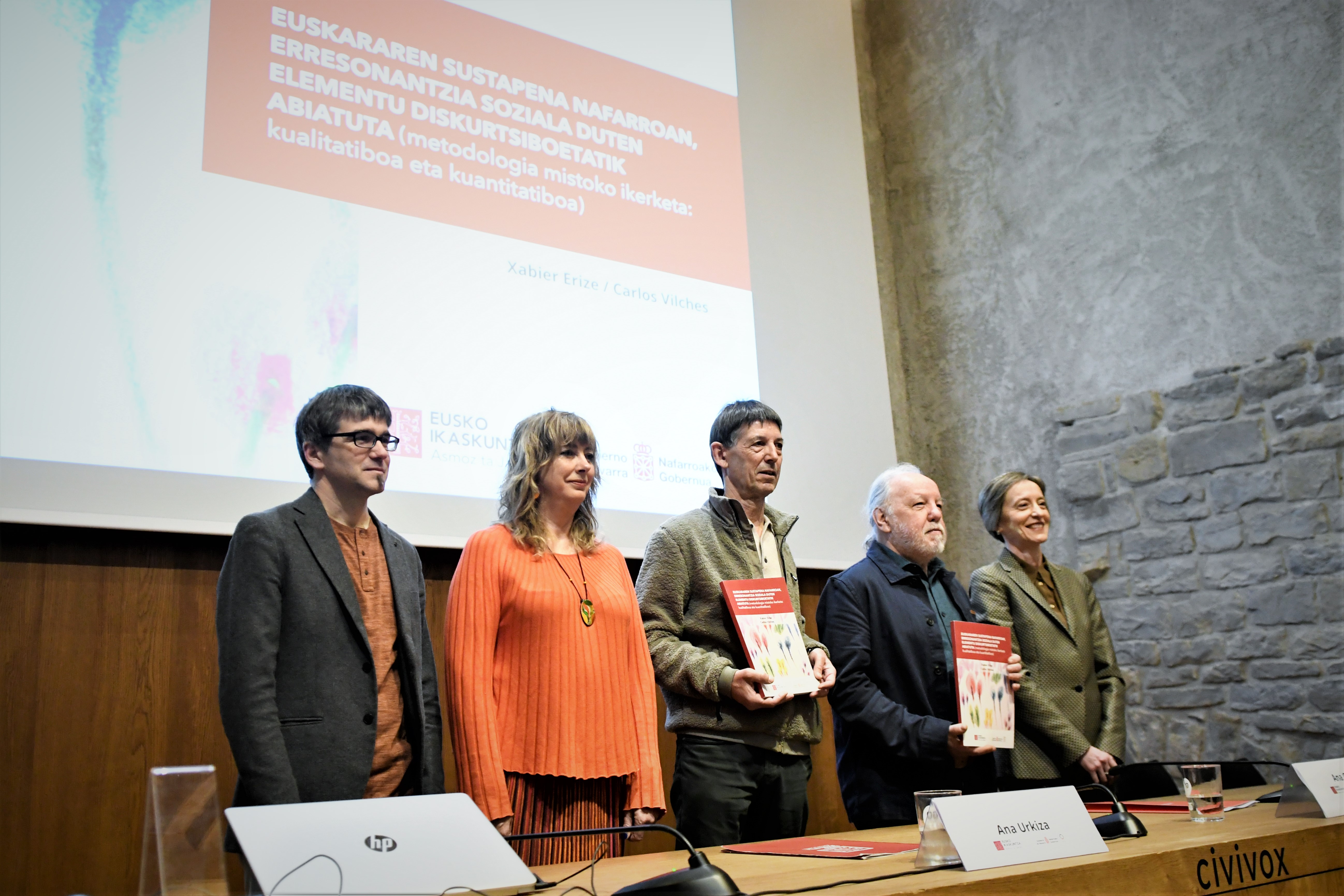
The presentation was attended by Ana Urkiza, President of Basque Learning, Ana Ollo, Vice-President of the Government of Navarre and Councillor for Memory and Coexistence, External Action and Basque, Xabier Erize and Carlos Vilches, Researcher and Scientific Director, and Javier Arakama, Managing Director of the Euskarabidea-Basque Institute of Navarre, who was present this Tuesday at the Palacio del Condestal of Pamplona.
Vice-President Ollo, while thanking the researchers for their work, stressed the importance of research for two reasons. In terms of scope and mission, Ollo recalls that it is part of "the commitment of the Government of Navarre to a stable collaboration with institutions such as Eusko Learning,which allows us to undertake debates and planning in the field of language policy with a scientific and analytical support and approach. This, he adds, allows us to achieve a restful and profound approach, as well as to analyze the opinions and the deep currents that move in the society in which we are debtors." In this sense, the Councillor for Memory and Coexistence, External Action and Basque stressed the usefulness of these studies in guiding the linguistic policies of the Government of Navarre, which "reflects and takes into account the diversity of our community, betting on the importance of coexistence –even of the languages– from the diversity, and finally emphasizes Basque as an added value in the European context and an increasingly uniform world".
Ana Urkiza, President of Basque Studies, explains what prompted this research. Specifically, "a participatory, deliberative and open work program called Democratic Management of Diversity in Navarre, through the agreement between the Government of Navarre and Basque Learning, which was carried out from 2019 to 2023 (...) to know the strengths and weaknesses of coexistence in the Foral Community". Likewise, Urkiza is grateful for the work of the research team "for revealing positions to promote the knowledge and use of the Basque language in Navarre and for clarifying the direction to follow in the future". He concluded by stressing the value of research, since "languages should not be seen as an element of social fragmentation, but rather as an element of integration with respect for all identities".
The research is based on the premise that "languages such as Basque share a challenge: to be promoted with social acceptance in a democratic society. The identification and analysis of discursive elements that can achieve social acceptance or resonance could serve as a basis for the promotion of the Basque language in a culturally diverse territory with a particular sociolinguistic context: The percentage of Basques in Navarre is lower than in other territories and their geographical distribution is very different, social opinions about the protection and support of the language have a special impact, and the level of dialogue on linguistic policy is low", explains the study.
Conclusions and methodology of the research work
The main objective of the research was to identify and analyze discursive elements related to the promotion of the Basque language with greater and lesser social acceptance in Navarre society. To know, as a specific objective, the basic social distribution: by linguistic groups (Basque, semi-Basque), age groups, genders and sociolinguistic territories.
Following the mixed methodology, a qualitative phase was developed during 2023. During this phase, through teamwork with people representative of the main sociodemographic profiles of the population of Navarre, the most repetitive discursive elements were identified. This was quantitatively validated in 2024 through surveys of almost a thousand people in Basque and Spanish.
The report provides detailed data from empirical research carried out to analyse and interpret the social reality of the Basque language in Navarre. Among the main conclusions, 63% of the inhabitants of Navarre are in favor or very favorable to the promotion of the Basque language. 20% is "neither for nor against", and only 17% is "opposite or very opposite". The scientific directors of the report, Xabier Erize, sociolinguist and PhD in Philology, and Carlos Vilches, sociologist and PhD in Sociology, have described the results as "innovative and important" in addressing the promotion of the Basque language in Navarre society. These results also have practical applications for territories where both Basque and other regional or minority languages are spoken, where the promotional work should be based on discursive elements with a strong social impact.
This was a special and differential study: it was carried out for the first time in Navarre, in consultation with the entire population, not only in specific sectors, using a mixed methodology, qualitative and quantitative; in the concepts applied (although Erice had used them before); and in the results and analyses, in which the internal cohesion between the qualitative and quantitative phases has been specially addressed. In addition, no cases similar to the social and methodological globality of the current study are known in the other languages, despite the large number of high-quality sociolinguistic studies.
93% support "mutual respect and tolerance" between the two languages themselves
In addition to this "synthetic or aggregated indicator" of 63%, which includes several variables to be able to quantify "the attitudes of the inhabitants of Navarre towards the promotion of the Basque language", the extensive study includes other data included in the synthesis section that are relevant and consistent with it. Thus, 85% of the population consider that "Basque is a cultural wealth that must be protected". The society (62%) also believes that it should move away from "partisan use" because it is "harmful to the Basque language". In this line of support for linguistic coexistence, 93% expressed their support for "respect and tolerance between Basque and Spanish and their speakers".
In terms of future prospects, 64.8% believe that in the coming years the percentage of people who know Basque in Navarre will "increase", and they see this as something they "would like" to happen in almost the same proportion (64.1%). At the same time, 65.4% admitted that they "would have liked to have studied Basque". For this reason, the majority of respondents consider it positive to promote contact with this language among children (82% "would consider it appropriate to include in the school programs some basic cultural notions about the Basque language in Navarre, and 63% believe that in Navarre more cultural activities in Basque should be offered for children and families), as well as the advancement of the government in the promotion of the Basque language.
In fact, 84% are in favor of the promotion of the Basque language, a percentage that does not come from the sum of at least 34.4% of the population that believes that it should be protected as it is now, since 49.6% are in favor of increasing this protection. On the other hand, only 13% have requested a reduction in this promotion of their own language. However, as in speaking of the importance of language in obtaining jobs in the administration, most believe that it is important to consider graduality and voluntariness.
In this sense, when asked about the presence of the Basque language in the work area of the administrations of Navarre, 73.7% are "favorable", both "for all people" (17.4%), "for certain jobs" (29.6%) and "for certain areas" (26.7%). On the other hand, one in four (26.3%) say that "no one should be asked to speak Basque to start working in the administration". The presentation of the study was followed by a period of discussion. A summary of the study can be consulted at this link or download the full study here.
Sarriguren, Tafalla, Noain, Buztintxuri eta Gares herrietako D-PAI ereduko ikastetxeetako familiak kalera aterako dira Hezkuntza Departamentuak foru lege bidez ingeleseko orduak handitu nahi dituela salatzera. Euskarazko murgiltze ereduaren kontrako erabakia dela iruditzen zaie... [+]
Prentsaurrekoan, maiatzaren 17an ospatuko duten Erriberako Euskararen Egunaren inguruko argibideak eman dituzte. Ume, gazte zein helduentzat zuzendua izango da. Ekimena, Erriberan egiten diren ekimenetan indarrak biltzeko eta euskararen normalizazioaren alde saretzeko... [+]
Nafarroako Ikastolen Elkarteak lehendakari berria du. Oier Sanjurjok hartu dio lekukoa Elena Zabaleta Andresenari. Beste zazpi kide izanen ditu alboan Sanjurjok.
Ez dira gutxi azken boladan euskara bere onenean ez dagoela eta bere transmisioa bermatuta ez dagoela ohartarazten ari diren ahotsak. Bestetik, inork ez du ukatzen hezkuntzak ezinbesteko betebeharra duenik euskara eta euskal kulturaren biziraupenerako. Erronka estrategikoa... [+]
Iruñeko haur eskoletako zuzendariek, EH Bildu, Geroa Bai, Zurekin Nafarroa eta PSNren arteko akordioa kritikatu dute. “Murgiltze ereduaren alde egin dugu beti, baina inoiz ez da gure iritzia kontutan hartzen” salatu du Euskalerria Irratian, Garikoitz Torregrosa... [+]
Euskarazko eskaintza handitzeko akordioa erdietsi dute EH Bilduk, PSNk, Geroa Baik eta Zurekin Nafarroak
Plazara, AEK, Uda Leku, Dindaia eta Ebete antolakundeak Baionan elkartu dira Famili'on egonaldi ibiltariaren lehen edizioa aurkezteko. Hizkuntza mailaren arabera eskaintza bat edo beste egongo da eta haur zein gurasoentzat izango da udaberrian.
Administrazio Epaitegiak arrazoia eman dio EH Bilduk Lizarrako plantilla organikoaren hizkutnz profilen aurka jarritako helegiteari.









